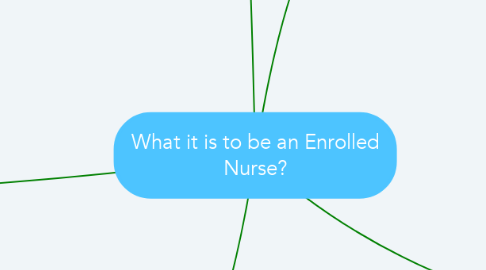What it is to be an Enrolled Nurse?
by Shenay Wilson-Casey

1. LAW
1.1. EN's must be recognised as professional healthcare workers by Law to practise within a workplace
1.1.1. All education is to be completed and the Nurse must be registered with the Nursing and Midwifery Board of Australia
1.2. EN's must document all Client information truthfully and confiendially
1.2.1. No Client information is to be accused or maintained outside of the professional workplace
1.3. Work within Scope of Practise
1.4. Civil Law
1.5. Must gain content before touching a Client
1.5.1. The Client must have a legal capacity to give consent
1.5.1.1. The Client understands the nature of the touch or treatment
1.6. Just as in the four elements of negligence, there are four (4) elements of defamation:
1.6.1. it must have been published (written or spoken)
1.6.2. there must be a statement of fact or opinion or implied fact or opinion
1.6.3. it must tend to harm a person's reputation
1.6.4. it must refer to the person alleging the defamation.
1.7. Despite the need to maintain confidentiality, there are circumstances where nurses may breach the tenet of non–disclosure- if the Client is a risk to themselves or others
2. SOCIAL MEDIA
2.1. Enrolled Nurses must comply with professional obligations
2.2. Health professionals need to maintain professional standards and be aware of the implications of their actions when interacting on social platforms
2.3. EN' need to be aware that information circulated on social media may end up in the public domain, with any comments associated being made public
2.4. An EN is never to film or photograph a Client for personal use
2.5. Health Professionals must not discuss work related issues on social platforms
2.6. Health practitioners need to be aware of their ethical responsibilities when they are interacting online
2.7. Interactions made online should be no different to professional interactions made within the workplace
2.8. EN's are to be aware of company policies regarding Social Media
3. STANDARDS OF PRACTICE
3.1. As regulated health professionals, RNs are responsible and accountable to the Nursing and Midwifery Board of Australia (NMBA)
3.2. Continuous thinking and analysis in thoughtful development and maintenance of relationships with Clients and Co-Workers
3.3. Maintains the capability for practice
3.4. Comprehensively conducts assessments
3.5. Develops a plan for nursing practice
3.6. Provides safe, appropriate and responsive quality nursing practice
3.7. Evaluates outcomes to inform nursing practice
3.8. Communicates effectively, and is respectful of a person’s dignity, culture, values, beliefs and rights
3.9. Provides a comprehensive safe, quality practice to achieve goals responsive to the nursing needs of Clients
4. ETHICS
4.1. Advocates on behalf of people in a manner that respects the person’s autonomy and legal capacity
4.2. Conducts assessments that are holistic as well as culturally appropriate
4.3. Nurses value quality nursing care for all people
4.4. Nurses value a culture of safety in nursing and health care, informative decision making and ethical management of information
4.5. Nurses recognise and value diversity of people and respect their culture, values and morals
4.6. Nurses are open minded and treat Clients regardless of culture, race, background, status. Including immigrants, asylum seekers, refugee and detainees
4.7. Nurses promote health and wellbeing
4.8. Commitment to respecting, promoting, protecting and upholding the fundamental rights of people
4.9. Moral responsibility to safeguard the inherent dignity and equal worth of everyone
4.10. Follow guidelines and process procedures
4.11. Recognise that they are accountable for the decisions they make regarding a person’s care
5. PROFESSIONAL BOUNDARIES
5.1. EN's are professionals who work with Clients to achieve their choices through maintaining a collaborative partnership
5.2. Informed choice and consent
5.3. EN's treat personal information obtained in a professional capacity as confidential; and do not use information or their position of power to advantage themselves in any way
5.4. EN's maintain professional boundaries between themselves and Clients
5.5. EN's seek support and guidance from professional leaders when they have concerns relating to boundaries in care relationships


